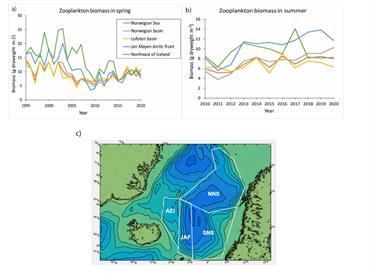Primary productivity
In recent years, annual primary production has been higher, in general, compared to earlier in the time series (Figure 9). This may be caused by increased inflow of cold and fresh Arctic water that has higher nutrient concentrations. Spring blooms have also tended to end later in recent years (Figure 9).
Zooplankton
There has been a general increase in zooplankton biomass both in spring and summer since 2010, with high variability across years and sub-areas of the ecoregion (Figure 10).
Changes in the occurrence and abundance of ecologically important copepod taxa have also been observed, possibly related to reduced inflow of Arctic water into the southwestern part of the Norwegian Sea. Higher-than-average heat content in the Norwegian Sea, timing effects, and top-down effects from large pelagic fish stocks and carnivorous zooplankton also influence the observed dynamics, but their relative importance is unknown.

Figure 10 (click to enlarge): Indices of zooplankton biomasses (g dry weight m-2) in the upper 200 m of the water column in the Norwegian Sea and adjacent water: a) in May during the time period 1995–2020, b) in July/August during the time period 2010–2020. The total area has been divided into 4 sub-areas (delineation shown in panel c); Red: southern Norwegian Sea including the Norwegian Sea Basin (SNS in panel c); Blue: Northern Norwegian Sea including the Lofoten Basin (NNS); Black: the Jan Mayen Arctic front area (JAF); Green: the area East of Iceland (AEI); Grey: the mean index of the sub-areas southern- and northern Norwegian Sea.

